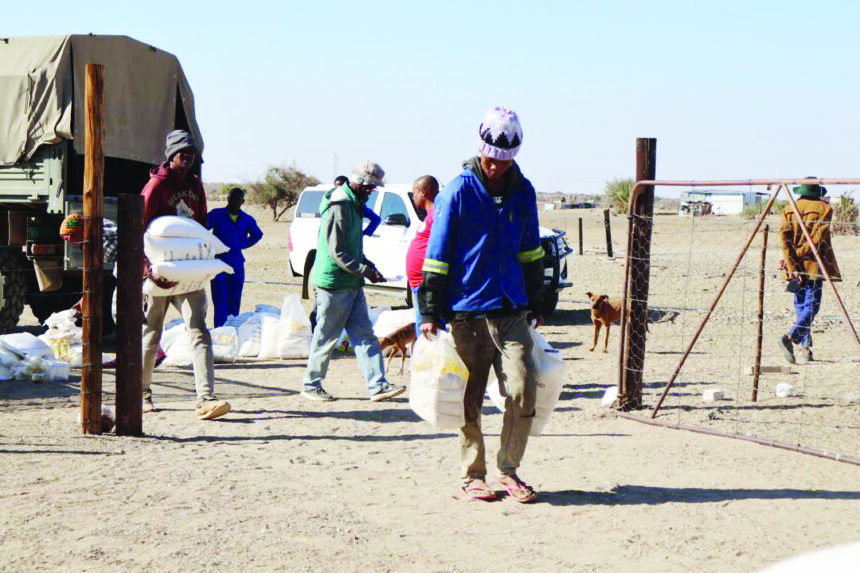The politicisation of drought relief, officials’ failure to take good care and lack of public awareness about the ongoing drought relief programme are harbingers crippling the government’s drought relief efforts.
Prime Minister Saara Kuugongelwa-Amadhila highlighted these challenges during yesterday’s opening of the two-day National Platform on the Implementation of the 2024/2025 Drought Relief Programme, which ends today in the capital.
The gathering was attended by governors, chairpersons of regional councils and regional disaster risk management committees, line ministries and government stakeholders involved in the drought relief programme.
She used the platform to strongly caution those entrusted with rolling out the drought relief programme,
saying the days of governors and councillors failing to honour their responsibility and playing politics with drought relief food will soon be over.
“The infighting by political heads in the regions must come to an end because you people are busy playing politics there while ordinary, hungry Namibians are waiting to receive their food from those of you who are entrusted with that responsibility. The theft of drought relief food is also another issue hampering government efforts. We have taken note of these challenges, and we will soon put an end to it,” said an irate Kuugongelwa-Amadhila.
She warned: “As central government, we will not hesitate to forcefully come to your region, and take over the distribution of the food ourselves. If you are failing as a governor or councillor, we will take over that process in your region and run it from Windhoek. We can’t allow you to play politics with people’s lives. This is a priority programme of government that is aimed at lifting Namibians from poverty, and stopping the scorch of malnutrition. We can’t sacrifice and risk the lives of Namibians at the expense of individual political ambitions.”
The primary objective of this event is to provide an overview of the drought relief programme, address challenges experienced, and strengthen coordination between the national and regional disaster risk management structures.
Hunger
Hunger in the country is not only a catchphrase, but has phases and real human statistics to it.
As it stands, the latest Integrated Food Security Phase Classification report estimates that 1.15 million people in Namibia, which is about 38%, face high levels of acute food insecurity, and require urgent action to reduce food gaps and protect livelihoods.
While the main assumption on the impact of El Nino was adjusted, the deterioration of the food security situation is still linked to the negative impact of El Nino on crop and livestock production, price shocks, economic decline and unemployment.
In the first projection period of the report, which covers October 2024 to March 2025, the food security situation in the country is expected to worsen due to the start of the lean season and seasonal price increases, where 1.26 million people are expected to be affected.
Among the regions, Kunene stands out as the most-affected, with 10% of its population facing critical levels of food insecurity. Furthermore, Kunene, Hardap, Kavango East, Kavango West, Khomas, Ohangwena, Omaheke and Zambezi each have 5% of their populations facing severe food insufficiencies.
Meanwhile, the national food stock levels in various silos across the country remain alarmingly low, standing at just 15% of the silos’ holding capacity of 22 900 metric tonnes as of June 2024. These low levels underscore the severity of the food insecurity crisis in Namibia, and highlight the urgent need for comprehensive and sustained humanitarian assistance to address the multifaceted drivers of food insecurity as well as support the affected populations countrywide.
Intervention
The prime minister also shared at yesterday’s meeting that for the government to fully address the drought situation, especially the fair and timely distribution of food and the effective rollout of the livestock support programme, a war chest of around N$1.3 billion will be needed.
So far, local and international partners have made monetary and material donations worth N$12 million towards the government’s drought relief efforts, and pledges worth close to N$300 million have likewise been made by various stakeholders and partners.
“I must also share that the livestock support programme has been very slow, as our farmers are not coming through to submit claims as desired. The slow processing of payments for farmers who have already claimed is another problem. I call upon those responsible for processing payments to make sure the programme is efficient, and payments are made on time because we need to clear the payment backlog,” she added.
In May this year, President Nangolo Mbumba declared a state of emergency on drought, following the worst dry spell which Namibia has ever experienced in the last 100 years.
The President’s decision was informed by a government-initiated drought assessment, which established that about 331 000 households needed to be registered countrywide to receive drought food aid.
A Cabinet decision, which is in line with Mbumba’s declaration, has made provision for a budget of N$600 million to distribute food to drought-stricken communities until 30 June 2025, and N$100 million for livestock and water supply, as well as N$25 million for seed and other agronomic and horticultural needs until 31 March 2025.
-ohembapu@nepc.com.na



